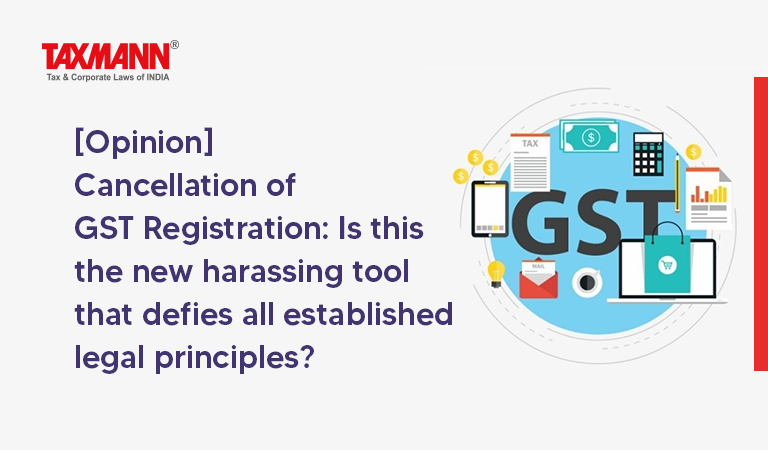[Opinion] Cancellation of GST Registration: Is this the new harassing tool that defies all established legal principles?
- Blog|News|GST & Customs|
- 3 Min Read
- By Taxmann
- |
- Last Updated on 2 December, 2022

Abhishek Tripathi – [2022] 145 taxmann.com 210 (Article)
The GST department has begun halting business operations via Show Cause Notice (‘SCN’), citing the provisions of the Goods and Services Act (‘GST’) Act/Rules as the primary grounds (or reason) for commencing cancellation proceedings and immediately suspending the GST registration of the Noticee. These SCN are just two or three lines, and they are essentially a replication of the statutory provisions regarding cancellation proceedings. An example of SCN is shown below, in which the department has halted/suspended the registered person’s (or ‘assessee’) whole business.
Whereas on the basis of information which has come to my notice, it appears that your registration is liable to be cancelled for the following reasons:
1. Issues any invoice or bill without supply of goods and/or services in violation of the provisions of this Act, or the rules made thereunder leading to wrongful availment or utilization of input tax credit or refund of tax.
The very basic concept of the SCN is to give the other party (Noticee) a chance to produce his/her defence against the Notice. If someone has to produce a defence against anything, then such a person is required to know the case which is made out against him/her.
It is a fundamental concept of tax law that the entire case of the department is founded/based on the SCN. As a result, the SCN is the most significant document. It is the department’s responsibility to build a case against the Noticee (registered person or assessee). We had comprehensive SCN under the erstwhile Indirect Tax regime, which consisted of (i) Facts, (ii) Relied Upon Documents (iii) Violation of statutory provisions based on such Facts and RUD, (iv) Consequence of such violation and, (v) Show Cause (produce satisfactory defence) against the Notice. The Hon’ble Supreme Court has given forth the required elements of a Notice in Gorkha Security Services v. Government (NCT of Delhi) [2014] 9 SCC 105, which are more or less these five points simply stated before.
Suppose (as a hypothetical analogue in criminal law) the substance of the FIR is solely a replica of section 302 of the IPC. If the individual is arrested as a result of such an FIR and then asked to establish why he/she should not be given the death sentence. How can a person defend himself/herself in the face of such a hazy FIR? How can the individual prove that he did not murder someone if he has no knowledge of the facts? Is it the complainant’s and/or the state’s responsibility to prove that he/she did commit murder by putting together a proper case with facts and evidence?
Suspending/Cancelling a business is analogous to justifying the death sentence. Lately, under GST, the SCN consists merely of the provisions of the GST Act/Rules and requires a response as to why the registration should not be cancelled. And, these two-three lines SCNs are widespread across the country, causing many business operations to suffer.
May we conclude that these SCNs are ambiguous violating natural justice since they lack the material on which a satisfactory reply can be filed? The answer may be found in CCE v. Brindavan Beverages (P.) Ltd., 2007 taxmann.com 728/2007 (213) ELT 487 (SC)/ [2007] 5 SCC 388, where the Hon’ble Supreme Court held that if the SCN is devoid of contents, the Notice is in breach of natural justice since no substantive reply can be made to such Notice.
Click Here To Read The Full Article
Disclaimer: The content/information published on the website is only for general information of the user and shall not be construed as legal advice. While the Taxmann has exercised reasonable efforts to ensure the veracity of information/content published, Taxmann shall be under no liability in any manner whatsoever for incorrect information, if any.

Taxmann Publications has a dedicated in-house Research & Editorial Team. This team consists of a team of Chartered Accountants, Company Secretaries, and Lawyers. This team works under the guidance and supervision of editor-in-chief Mr Rakesh Bhargava.
The Research and Editorial Team is responsible for developing reliable and accurate content for the readers. The team follows the six-sigma approach to achieve the benchmark of zero error in its publications and research platforms. The team ensures that the following publication guidelines are thoroughly followed while developing the content:
- The statutory material is obtained only from the authorized and reliable sources
- All the latest developments in the judicial and legislative fields are covered
- Prepare the analytical write-ups on current, controversial, and important issues to help the readers to understand the concept and its implications
- Every content published by Taxmann is complete, accurate and lucid
- All evidence-based statements are supported with proper reference to Section, Circular No., Notification No. or citations
- The golden rules of grammar, style and consistency are thoroughly followed
- Font and size that’s easy to read and remain consistent across all imprint and digital publications are applied



 CA | CS | CMA
CA | CS | CMA
